I will be on holiday for most of October (in New England) so there won’t be another newsletter until end October. In this context, this newsletter covers all known events until the end of November.
Tomato: know, sow, grow, feast
The winner of the random draw was Vicki Jordan, from Lower Plenty. A copy of the book has been duly posted to her. The rest of you will have to buy the book online at Booktopia for $45.
Although not required to, a number of people sent in comments when they entered the draw. Here’s a selection:
- May I please enter the draw to win the book. My husband could live on tomatoes alone. It would be a great Christmas present for him.
- I would love to give the book to an ardent tomato grower friend of mine.
- I could do with some help.
- I would love the tomato book. I just potted up 600 tomatoes for our school fete.
- I would love to receive this book about heirloom tomatoes. I have tried to plant them in recent years but unsuccessful. I hope with this book I will have a good crop and share the fruits with family and friends.
- As a tomato grower of many years I’ve had successes and failures and would love to know more about the failures in the hope of securing more successes.
- Will it improve my chances if I say that I love your newsletter?
- I really want to win it.
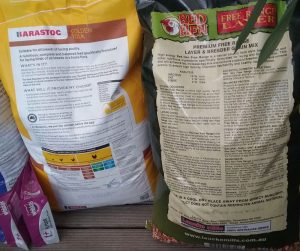 Need some free chook food?
Need some free chook food?
Newsletter reader Janet's chickens have just been killed by foxes so she has no need for two unopened 20Kg bags of chook food. Pickup Eltham. Email us if interested and we’ll put you in touch. First come, first served.
Judy interviews Meg Montague
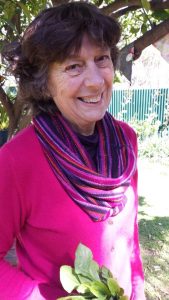 Some of you will know Meg through her various activities around Darebin and/or her involvement with Foodbank Victoria. Judy Vizzari has now interviewed Meg as a home grower. To quote Judy quoting Meg: “I’ve always grown vegetables – I never ‘decided’ [to grow them], I’ve just always grown them.“, “The philosophy around this garden is that it’s very much a social space – for families, for parties and for eating outside. These activities sometimes inhibit the growing of vegetables, so it’s not a fully food producing garden.” and “Gardening is relaxation, it’s economy – it’s all sorts of things.“. Read the full interview. We are beginning to run short of interviewees. If you would be willing to be interviewed about your garden, email us.
Some of you will know Meg through her various activities around Darebin and/or her involvement with Foodbank Victoria. Judy Vizzari has now interviewed Meg as a home grower. To quote Judy quoting Meg: “I’ve always grown vegetables – I never ‘decided’ [to grow them], I’ve just always grown them.“, “The philosophy around this garden is that it’s very much a social space – for families, for parties and for eating outside. These activities sometimes inhibit the growing of vegetables, so it’s not a fully food producing garden.” and “Gardening is relaxation, it’s economy – it’s all sorts of things.“. Read the full interview. We are beginning to run short of interviewees. If you would be willing to be interviewed about your garden, email us.
Robin’s tip of the month – growing blueberries
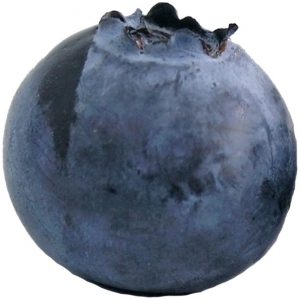 Blueberries can be grown successfully in North East Melbourne but they do require exceptional soil preparation. The soil needs to be quite acidic with a pH of 4-5. However, our soils are naturally closer to 7 (neutral) so the pH needs to be reduced by at least 2 points. To do this, add granular sulphur, work it into the surface, and water it in. You may have to do this several times and it is best to begin the process 3 months before planting. Once your blueberries are established, you can assist the soil remaining acidic by digging in sphagnum peat carefully around the shallow roots once a year, and fertilising with an acidic fertiliser. However over time, the soil will return to its natural pH and your plants will suffer. Remedial action is then required to again reduce the pH. Plant in a sunny, well-drained position. One of the best varieties for our area is Brigitta. [Editor’s note: in The Complete Book of Fruit Growing in Australia, Louis Glowinski recommends using well-rotted chicken manure as the fertiliser. His argument is that blueberries don’t like either nitrates or chlorides and that many commercial fertilisers contain such compounds.] [Editor’s second note: one way of helping to keep the soil acidic is to use pine needles as the mulch. There are a number of pine trees along the Yarra, for example at Lenister Farm – simply take some big bags and scoop the needles off the ground.] Read all of Robin’s tips.
Blueberries can be grown successfully in North East Melbourne but they do require exceptional soil preparation. The soil needs to be quite acidic with a pH of 4-5. However, our soils are naturally closer to 7 (neutral) so the pH needs to be reduced by at least 2 points. To do this, add granular sulphur, work it into the surface, and water it in. You may have to do this several times and it is best to begin the process 3 months before planting. Once your blueberries are established, you can assist the soil remaining acidic by digging in sphagnum peat carefully around the shallow roots once a year, and fertilising with an acidic fertiliser. However over time, the soil will return to its natural pH and your plants will suffer. Remedial action is then required to again reduce the pH. Plant in a sunny, well-drained position. One of the best varieties for our area is Brigitta. [Editor’s note: in The Complete Book of Fruit Growing in Australia, Louis Glowinski recommends using well-rotted chicken manure as the fertiliser. His argument is that blueberries don’t like either nitrates or chlorides and that many commercial fertilisers contain such compounds.] [Editor’s second note: one way of helping to keep the soil acidic is to use pine needles as the mulch. There are a number of pine trees along the Yarra, for example at Lenister Farm – simply take some big bags and scoop the needles off the ground.] Read all of Robin’s tips.
What seeds to plant in October
Here is a list (see the planting guide for more detail):
CucurbitsCucumber |
Other warm season veggiesBeans |
Leafy greensLettuce |
RootsBeetroot |
Other veggiesAsparagus |
Compared with September, the solanums (capsicum, chilli, eggplant and tomato), basil and coriander drop out of the list, whilst the cucurbits (cucumber, gourd, pumpkin, rockmelon, watermelon and zucchini) stay in. Note, however, that these lists are the months that it is ideal to plant particular seeds and that you can sometimes plant in other months. So, for example, if your tomato seeds didn’t germinate in September, it’s better to try again in October (or buy some seedlings) rather than face the prospect of no homegrown tomatoes. Helen Simpson has previously written ‘how to grow’ articles about many of the warm season veggies, namely: basil, chilli, cucurbits and tomatoes. Robin and Paul Gale-Baker have previously written about how to grow eggplants and capsicums. And Helen has written more generally about Spring veggie garden preparation.
Food swap news
The next Macleod Food Swap at 11am on Sunday, 20th October will include Sustainable Macleod‘s fifth annual community auction. The items include donations from local businesses, Sustainable Macleod members and others. They have over 100 items from fruit trees to cafe vouchers, health consultations to wine. The purposes of the auction are: to raise funds for the Macleod Organic Community Garden; to support their local shops and services; and to bring people to Macleod Shopping Centre. 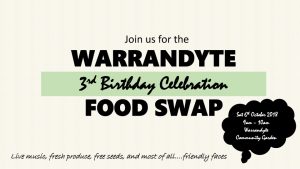 Warrandyte Food Swap is celebrating its 3rd birthday on Sunday, 6th October at 9am and they invite you to join them. Sarah Oleksiuk writes in: “Flashback from last year’s birthday celebrations. We celebrated new baby Lachlan, 2 university graduations, woofing in Canada, a plum role in the outback, winter in the Scottish Highlands and spring on a Queensland beach. Along the way, we enjoyed great produce, luscious greens, tomatoes, cumquats, lilly pilly, macadamia, turned grapefruit into conserve, chilli into ripper salads, all the time sharing stories enjoying community. A big shout out to Glenn and Chris for their constant support.” Incidentally, around 25 people from the Warrandyte Food Swap receive this newsletter. This is because Sarah, Liz, Carol and Tess proactively invite each new person at the swap if they would like to receive it and then email us the person’s details (name, email address and suburb). It would be great if your food swap could do the same, perhaps using this simple signup form.
Warrandyte Food Swap is celebrating its 3rd birthday on Sunday, 6th October at 9am and they invite you to join them. Sarah Oleksiuk writes in: “Flashback from last year’s birthday celebrations. We celebrated new baby Lachlan, 2 university graduations, woofing in Canada, a plum role in the outback, winter in the Scottish Highlands and spring on a Queensland beach. Along the way, we enjoyed great produce, luscious greens, tomatoes, cumquats, lilly pilly, macadamia, turned grapefruit into conserve, chilli into ripper salads, all the time sharing stories enjoying community. A big shout out to Glenn and Chris for their constant support.” Incidentally, around 25 people from the Warrandyte Food Swap receive this newsletter. This is because Sarah, Liz, Carol and Tess proactively invite each new person at the swap if they would like to receive it and then email us the person’s details (name, email address and suburb). It would be great if your food swap could do the same, perhaps using this simple signup form.
Community gardening news
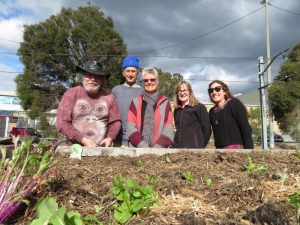
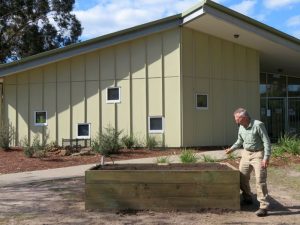 A team from Incredible Edible Eltham, led by Paul Gale-Baker, has installed a wicking bed at Eltham Child Care Co-Op (see left hand picture). Another team has done the spring plantings at the edible food gardens at both Eltham Railway station and outside healthAbility on Main Road (see right hand picture). The plantings include alyssiums, beetroot, lettuce, marigolds, mizuna, mustard greens, oregano, radish, rocket, silverbeet, spinach, spring onions and strawberries.
A team from Incredible Edible Eltham, led by Paul Gale-Baker, has installed a wicking bed at Eltham Child Care Co-Op (see left hand picture). Another team has done the spring plantings at the edible food gardens at both Eltham Railway station and outside healthAbility on Main Road (see right hand picture). The plantings include alyssiums, beetroot, lettuce, marigolds, mizuna, mustard greens, oregano, radish, rocket, silverbeet, spinach, spring onions and strawberries.
Which link was clicked most times in the last newsletter?
Angelo’s article on small space tomato growing.
Proverb of the month
Grist to the mill. Meaning: useful for a particular purpose or helps support someone’s point of view. Dates back to at least the 16th Century, when grist was unground wheat that was brought to a mill to be ground into flour. A miller ground whatever grain was brought to him, and charged a portion of the final product for the service, so all grain arriving at the mill represented income regardless of its quality. It is one of 13 metaphors designated by George Orwell in 1946 as dying (“a huge dump of worn-out metaphors which have lost all evocative power and are merely used because they save people the trouble of inventing phrases for themselves”). Incidentally, the word ‘grist’ is apparently completely unrelated to the word ‘grits’, even though their meanings are similar (before grits became used to describe a weird form of American porridge made out of maize, it meant oats that had been husked/hulled but not ground). Read all the proverbs.
Gardening quote of the month
“Gardening is not a rational act.” by Margaret Atwood. Read all the quotes.
Joke of the week
You throw away the outside, cook the inside, then eat the outside, and throw away the inside, what am I? Corn on the cob. Read all the jokes.
New events
Farming for kids, with farmer Em
What: Farmer Em is a qualified teacher who is passionate about inspiring new young growers. When: Saturday, 6th October, 11am-midday. Where: Joe’s Market Garden, Coburg. Cost: $10. Bookings: EventBrite. Further information: LFC calendar entry.
Mushroom workshop – cultivating gourmet mushrooms in your garden
What: Tyler Cameron will run the workshop. Tyler is a small-scale gourmet & medicinal mushroom farmer and amateur mycologist based in Bundoora, Melbourne. He will focus on outdoor mushroom growing. At the workshop, you will install a King Stropharia (Garden Giant) mushroom patch, as well as inoculate logs with various different species of edible and medicinal mushrooms for the community garden. You will learn how to make their own ‘spawn’ for outdoor mushroom growing, and take home a mushroom ‘culture’ to start your own patches. When: Saturday, 6th October, 11am-1pm. Where: Bellfield Community Garden. Cost: $10. Bookings: by email. Further information: LFC calendar entry.
Linking Lalor
What: Learn about traditional bush tucker at Links Community Garden. Participate in a traditional Aboriginal smoking ceremony. Try out some art activities. Follow the local cultural heritage trail of Bern Emmerichs’ fascinating artworks leading to the original ceramic murals in Peter Lalor Walk. When: Saturday, 6th October, 12.30-2.30pm. Where: Links Community Garden Lalor. Cost: free. Bookings: just turn up. Further information: LFC calendar entry.
Fermented food
What: Tim McNeilly, from Really Awesome Wholefoods, will run this fermentation talk and kimchi workshop. When: Thursday, 11th October, 7-8.30pm. Where: Lalor Library. Cost: free. Bookings: their website. Further information: LFC calendar entry.
Asian cooking with Jean
What: Join Jean from Jean’s Asian Cooking as she demonstrates stir-fry Asian dishes. Followed by tastings. When: Thursday, 25th October, 7-8.30pm. Where: Mill Park Library. Cost: free. Bookings: their website. Further information: LFC calendar entry.
Healthy productive compost and worms
What: What you will learn: the importance of compost for soil health; how to fix common composting problems; and setting up and looking after a worm farm. Presented by Maria Ciavarella. Learn how to make great compost, the essential ingredient for a thriving and healthy garden. You will also look at worm farms and Bokashi as other options. You will also be shown how to make a DIY worm farm using recycled products. When: Thursday, 22nd November, 6.30-9pm. Where: Bulleen Art and Garden. Cost: $50. Bookings: WeTeachMe. Further information: LFC calendar entry.
Home brewing with Paul Rigby
What: What you will learn: make your own beer; all about full grain brewing; and the fermentation process. What you will get: samples of different beers; and recipes to take home. The workshop will be a practical demonstration of full grain brewing covering ingredients (including malt, hops, yeast and water), equipment, brewing theory, and (most importantly) the brewing process (including mashing, lautering, boiling, sanitation, fermentation and packaging). Samples will be available for tasting. When: Saturday, 24th November, 10am-3pm. Where: CERES. Cost: $70. Bookings: WeTeachMe. Further information: LFC calendar entry.
Summary of upcoming events
Over the next week
- Beginners home brewing: Wednesday, 26th September, 6.30-8pm.
- Produce in pots: Thursday, 27th September, 6.30-9pm.
- Cook Indian by the creek: Friday, 28th September, 6.15-8.15pm.
- Nuka duke – rice bran pickling: Saturday, 29th September, 10am-12.30pm.
- Autumn moon Chinese bao buns: Saturday, 29th September, 11am-midday.
- Edible weeds walk: Saturday, 29th September, 11am-1pm.
- Block soil tomato seedling workshop: Saturday, 29th September, 2-3pm.
- Edible weeds walk: Saturday, 29th September, 2-4pm.
- Official opening of Macleod Organic Community Garden: Sunday, 30th September, 2-4pm.
- Beer – from hop seeds to drink: Tuesday, 2nd October, 7.15-9.15pm.
- Make sense of food labels: Wednesday, 3rd October, 9.30-11am.
- Cook Indian by the creek – kids special: Wednesday, 3rd October, 11am-midday.
- Buzzing around Edendale: Wednesday, 3rd October, 1-1.50pm.
- Buzzing around Edendale: Wednesday, 3rd October, 2-2.50pm.
- Essential coffee with Hugh Kelly: Wednesday, 3rd October, 7-9pm.
Over the rest of October
- Plant-based midweek cooking class: Thursday, 4th October, 6.30-8.30pm.
- Herbal teas: Thursday, 4th October, 6.30-9pm.
- Cooking master class: Thursday, 4th October, 7-9pm.
- Planning your summer veggie crop: Saturday, 6th October, 9.30-11am.
- No Waste Cook Club Fitzroy: Saturday, 6th October, 10am-midday.
- Farming for kids, with farmer Em: Saturday, 6th October, 11am-midday.
- Mushroom workshop – cultivating gourmet mushrooms in your garden: Saturday, 6th October, 11am-1pm.
- Shio koji making and cooking: Saturday, 6th October, 11am-1.30pm.
- Planning your summer veggie crop: Saturday, 6th October, midday-1.30pm.
- Linking Lalor: Saturday, 6th October, 12.30-2.30pm.
- Julie’s garden: Saturday, 6th October, 2-4pm.
- Set up and maintain a worm farm: Saturday, 6th October, 3-4pm.
- Chinese tea – a history and tasting: Sunday, 7th October, 11am-1pm.
- Permaculture Design Course by Pete the Permie (12 sessions): starting Thursday, 11th October, 9.30am-4.30pm.
- Food know how – The Urban Pear: Thursday, 11th October, 11am-12.30pm.
- Native edibles for companion planting: Thursday, 11th October, 6.30-9pm.
- Fermented food: Thursday, 11th October, 7-8.30pm.
- Composting and worm farming: Thursday, 11th October, 7-8.30pm.
- Festive inspired cooking master class: Thursday, 11th October, 7-9pm.
- Festive inspired cooking master class: Friday, 12th October, 7-9pm.
- Kevin Heinze GROW Spring plant sale: Saturday, 13th October, 9am-3pm.
- Bee hive tours: Saturday, 13th October, 10.30am-12.30pm.
- Edible weeds walk: Saturday, 13th October, 11am-1pm.
- Chocolate discovery class: Saturday, 13th October, 11.30am-12.30pm.
- Green at Kathleen – introduction to growing mushrooms: Saturday, 13th October, 11.30am-1pm.
- Bees in the ‘burbs: Saturday, 13th October, 3-4.30pm.
- Practically Green Festival: Sunday, 14th October, 10.30am-4.30pm.
- Raspberry winemaking: Tuesday, 16th October, 11.30am-12.30pm.
- Plant-based midweek cooking class: Thursday, 18th October, 6.30-8.30pm.
- Veggie gardening – beyond the basics: Thursday, 18th October, 6.30-9pm.
- Festive inspired cooking master class: Thursday, 18th October, 7-9pm.
- Nuka duke – rice bran pickling: Friday, 19th October, 2-4.30pm.
- Nutrition for seniors: Friday, 19th October, 2-3pm.
- Festive inspired cooking master class: Friday, 19th October, 7-9pm.
- Mexican – Day of the Dead: Saturday, 20th October, 10am-1pm.
- Open Cellars of the Artisan Hills: Saturday, 20th October, 11am-5pm.
- RetroSuburbia with David Holmgren: Sunday, 21st October, 10.30am-12.30pm.
- Miso paste making: Sunday, 21st October, 11am-1.30pm.
- Open Cellars of the Artisan Hills: Sunday, 21st October, 11am-5pm.
- Healthy lives plant-based cooking: Sunday, 21st October, midday-4pm.
- Hobby beekeeping: Tuesday, 23rd October, 10.30-11.30am.
- Fill your garden with fruit: Tuesday, 23rd October, 7-8.30pm.
- Native herbs for the kitchen and garden: Thursday, 25th October, 6.30-9pm.
- Asian cooking with Jean: Thursday, 25th October, 7-8.30pm.
- Wow it’s Italian – raspberry panna cotta: Thursday, 25th October, 7-9pm.
- No Waste Cook Club Carlton: Saturday, 27th October, 10am-midday.
- Alexandra and district open gardens: Saturday, 27th October, 10am-4pm.
- Chinese vegetarian cooking demo: Saturday, 27th October, 11.30am-1pm.
- Alexandra and district open gardens: Sunday, 28th October, 10am-4pm.
- Bee hive tours: Sunday, 28th October, 10.30am-12.30pm.
- ‘Buzz inn’ bee hotel making by TD Convivial Kitchen: Sunday, 28th October, 1-3pm.
During November
- Plant-based midweek cooking class: Thursday, 1st November, 6.30-8.30pm.
- The joy of backyard chooks: Thursday, 1st November, 6.30-9pm.
- No Waste Cook Club Fitzroy: Saturday, 3rd November, 10am-midday.
- Healthy lives plant-based cooking: Sunday, 4th November, midday-4pm.
- Growing fruit and veggies in small spaces: Thursday, 8th November, 6.30-9pm.
- Mexican – aguas frescas and kombucha: Saturday, 10th November, 11am-1pm.
- Green at Kathleen – preparing for summer harvest: Saturday, 10th November, 11.30am-1pm.
- Introduction to permaculture (two sessions): Saturday, 10th November and Sunday, 11th November, both 10am-4pm.
- Arthurs Creek Mechanics Institute’s 30th annual garden walk: Sunday, 11th November, 9.30am-5pm.
- Open Gardens Victoria – chooks in the city workshop: Sunday, 11th November, 10-11.30am.
- Open Gardens Victoria – chooks in the city workshop: Sunday, 11th November, 12.30-2pm.
- Plant-based midweek cooking class: Thursday, 15th November, 6.30-8.30pm.
- Bush foods & herbs for courtyards & balconies: Thursday, 15th November, 6.30-9pm.
- Healthy lives plant-based cooking: Sunday, 18th November, midday-4pm.
- Healthy productive compost and worms: Thursday, 22nd November, 6.30-9pm.
- No Waste Cook Club Carlton: Saturday, 24th November, 10am-midday.
- Home brewing with Paul Rigby: Saturday, 24th November, 10am-3pm.
- Bee hive tours: Saturday, 24th November, 10.30am-12.30pm.
